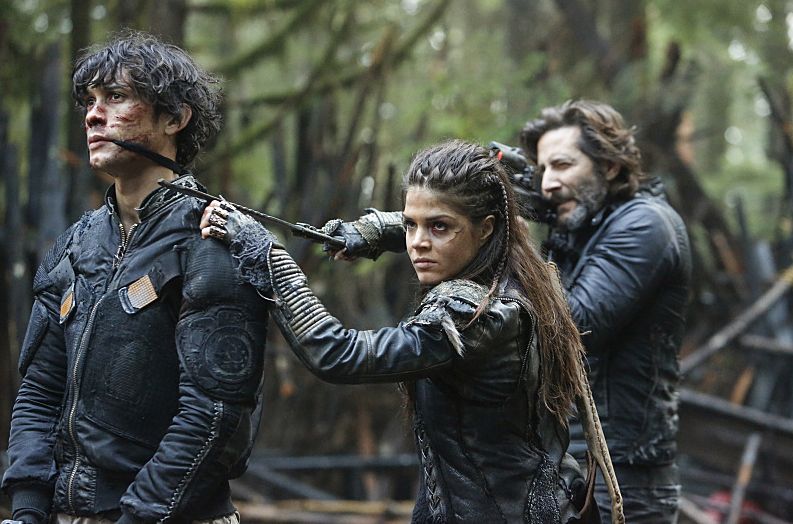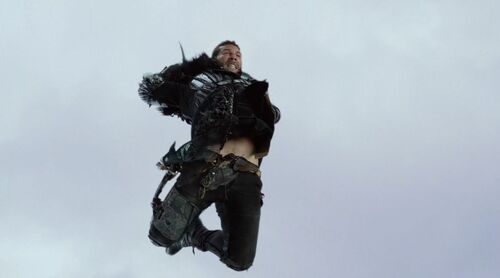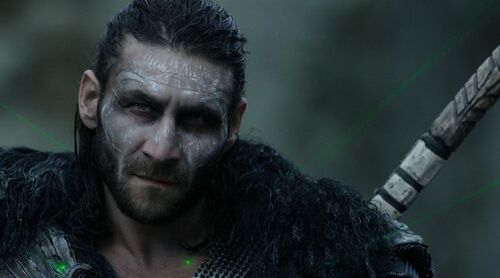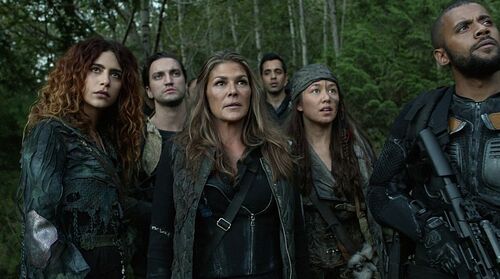
The 100 S3E10: "Fallen" Review
 Fallen picks up right after Lincoln’s execution, catapulting the characters into an action-packed and horror-filled episode.
Fallen picks up right after Lincoln’s execution, catapulting the characters into an action-packed and horror-filled episode.
It’s no secret that this season of The 100 has been a difficult one for fans. Two fan-favorite characters dying, other favorite characters turning (almost?) irredeemably dark-side, and a punishing cascade of events that began in episode one and hasn’t let up since. By this episode, the tenth, most fans I knew were asking, how much more before we get a win?
Well, we got a couple of victories this week, albeit victories The 100-style. Which means that there is a long way to go yet, but at least we have hope.
Hope is a weird word for an episode that is the most hands-down horror-filled episode The 100 has produced yet. Not only were there strong homages to Invasion of the Body Snatchers with ALIE’s City-of-Light zombies and Raven quoting Edgar Allen Poe’s “The Raven”, but the way in which The 100 used blood and gore in Fallen was clearly meant to be confrontational and frightening to the viewer. It wasn’t an easy hour of TV, but it was certainly an effective one.
What buoyed all of the horror was technically proficient writing, incredible performances from the entire cast, and the fact that the plot moved from despair into heroic action.
Fallen intertwined three plotlines: Polis, the Rebellion, and ALIE/Arkadia. Most of the episodes this season have had problems with storyline balance—one plotline often getting favored at the expense of another—but here, all three storylines were given proper proportion. Since each story dealt with the same thematic material (explored later in the review), the transitions worked well to offer interesting nuance to the material.
The episode begins in a devastating cold-open, fantastic in its technicality and with crushing performances from Bob Morley and Marie Avgeropolous. Bellamy watches in growing terror as the members of the insurgency that tried to save Lincoln, Kane, and Sinclair walk into the cave, slow-mo, the sound muffled and distant. Miller, Harper, and Bryan appear first, followed by Sinclair and Kane (giving Bellamy the most indescribably tragic look) and then Octavia walks through. The camera lingers on the entrance, where Lincoln should be but isn't, as shock registers in Bellamy’s face.
That is brutal itself, but then Octavia unleashes on Bellamy. Others try to intervene as she beats him, but Bellamy yells at them to back off. It is clear that he feels he deserves it, and that he wants to relieve any part of her pain that he can. The scene is heartbreaking, but also completely in-line with their characterization and the world in which they live. Bellamy would do anything to protect his sister, to ease her grief. Octavia has always chosen to deal with her problems by fighting. Both of them grew up in a society that executed people for the smallest crime. They don’t know restraint; they have never been allowed to feel, only to survive. This is how they cope. The narrative doesn’t excuse this action, and the devastation wrought by all of this violence is palpable. No one is exempt, no one is unscathed.
Arkadia, meanwhile, is a disaster. ALIE and Jaha are solidifying their hold on the Arkadian population. Raven, through sheer willpower and sensory overload, has driven ALIE from her brain long enough to find a solution. She enlists Abby and Jasper, telling them that they need to find the extra transponder wristbands that the Ark put on the hundred when they were sent to Earth. Raven could potentially reverse engineer it to send an electrical impulse into her body to kill the filaments that the Chip uses to control pain and memories.
When ALIE realizes what Raven is doing, ALIE gives Raven back her most terrible, painful memories: Finn’s execution, her bone marrow being drilled in Mount Weather, her surgery to remove the bullet from her spine. Raven’s screams echo in both the past and the present as she tries to fight off ALIE’s assault on her mind. It is a ghastly sequence that illustrates how traumatic-anxiety can overwhelm a person, how it feels to experience one of these attacks. Eventually, after several minutes of this mental torture, Raven submits to ALIE. She lies on a hospital bed, blank, at rest.
Then, she rises, slowly, as if lifted by invisible strings. She turns and tells an aghast Abby: I have full access to Raven’s synaptic network. She is ours.
Chills, chills, chills. I recapped the scene partially because I had no other way of doing Lindsey Morgan’s performance here justice. She embodies Raven’s struggle, one all too real to PTSD, trauma, and anxiety sufferers, and then she becomes an avatar for ALIE. The haunting calm, complete with physical and vocal transformation, is nothing short of astonishing. Lindsey Morgan is this episode’s MVP, hands down.
After all of the angst with the Rebellion and Arkadia, Polis is where there is levity…until the end. Time spent in Polis focused on Ontari and Murphy, and gave Ontari complexity while having Murphy taking steps into mentoring her in the art of survival. Revealing Ontari as a scared, out-of-her-depth teenager thrust into the commandership through no real choice of her own played into this episode’s (and this season’s) themes of consent and coercion. She didn’t have a choice, she tells Murphy. The Ice Queen kidnapped her, trained her, tortured her—all so at the right time Ontari could be commander. It’s not what she wanted, but here she is, and no one is going to take it from her.
The overarching themes of season three are free will, consent, coercion, what people do for—and to—each other and why. Episode one opens with Murphy locked in the bunker by Jaha, driven to the point of suicide. Lexa sends Roan to kidnap Clarke, Lexa kneels and pledges loyalty to Clarke, Pike assumes a dictatorship over Arkadia, ALIE and Jaha use increasingly terrible tactics to coerce people into joining the City of Light. These are just a few instances in the whole season, but everyone here thinks that they’re acting for the good of their people, for the benefit of humanity. So what if you have to force an individual into something they don’t want, as long as the whole benefits?
Fallen forces the subtext of the season into the foreground of each storyline. The opening scenes show us Bellamy consenting to being beaten up by his sister. This doesn’t make it right, or healthy, but multiple people try to intervene and he stops them. We see later, after he easily disarms Octavia even while handcuffed, that he could have stopped her himself. But he chose not to.
In Arkadia these issues are addressed more directly. Jaha states that they need to take away the free-will of the Arkers, that ALIE needs to find some way of circumventing the consent issue. They go after Raven first, but because they need Abby. They need Abby’s influence to get the reluctant people on board with taking the chip. ALIE takes over Raven’s brain and makes Raven slit her wrists to force Abby into taking the chip. Only by taking the chip will they release Abby to save Raven. It’s ALIE and Jaha knowing Abby’s weakness and pressing it as hard as they could. Abby would never let Raven die. And she doesn’t—she takes the chip, saves Raven, and then begins handing them out to the remaining Arkers.
Consent is explored less successfully in the final scene in Polis. After Murphy counsels Ontari into successfully remaining Heda for another day, she chains him up and seduces him. The situation is dubious consent at best, and the show has never approached sexual assault situations before so it’s hard to know how the narrative wants us to read the situation. But it’s not consent, and if it’s not consent then it’s rape. Murphy tries to play it off, but he wants to live, and she explicitly threatens to kill him if he doesn’t comply. How the story chooses to approach this moving forward is crucial, especially given how interesting the dynamic between the both of them was earlier in the episode. Adding an element of sexual threat makes what was an interesting and refreshing dynamic into something tawdry instead.
That scene is the one blight—and an unnecessary one at that—in an otherwise smart thematic episode. But what would season three of The 100 be without at least one of these scenes every episode?
Polis storyline aside, the Arkadia and Rebellion storylines conclude with victories for the Delinquents. Kane and Octavia take Bellamy to trade as a hostage when retrieving Monty from the dropship, in case it's a trap by Pike. It is—and Bellamy seemingly turns on Octavia and Kane to lead Pike to the Rebellion’s cave. Instead Bellamy leads Pike & co. to cross the blockade line, signaling the Grounder warriors, and in a moment of confusion grabs Pike’s gun to force him to not fight. The Grounders take Pike. Kane leaves with them to go meet the new Commander, but not before asking Bellamy, “Did you do this for your sister, or because it’s the right thing to do?”
Kane knows better than anyone what Bellamy is going through. As the person who ordered the Culling in season one, killing 320 people, Kane spent the rest of season one and season two trying to atone for his mistakes on the Ark. Kane knows he’s leaving for Polis, and doesn’t know for how long, but he won’t be there to guide Bellamy through this morass of guilt and self-hate. And only Kane can help him, because only Kane knows. The best he can do is start Bellamy questioning whether or not he actually knows the difference between doing anything to save Octavia/”his people” and true, systemic morality.
Jasper becomes the episode’s hero as he tranquilizes Raven, hauls her into the back of the Rover, then drives like hell for the gate. ALIE’s chip-zombie army activates, swarming to Arkadi's entrance. Jasper bursts through the electrified gate in a hail of sparks and gunfire when out of the gloom appears—
Clarke.
She gets in the car, clearly stunned, and they drive off into the foggy night. But not before she can see her mother, smiling placidly, at the front of the mob.
SUMMARY
Fallen is a disturbing, horrific episode to watch, but still the most hopeful entry into season three to date. While the episode may be too intense for some, its exploration of trauma, anxiety, and consent are brought to life through exhilarating performances from a ridiculously talented cast.
This episode differs from the previous nine by ending with three developments that offer hope for the rest of the season. One, Jasper Jordan’s heroic turn, signaling that The 100’s narrative conclusion is that the best way to overcome grief and pain is to experience it. That even those among us who cry, who feel pain, who experience depression, are heroes. It’s a strong message to send in a season where most of our heroes are preoccupied with avoiding their trauma, whether that means taking a chip, running away from their problems at home, or following despots.
The second is that Clarke returns home, and her entry back into the narrative is poignant but also hilarious. When the Rover roars to life, and Clarke kicks the guard trying to snatch Raven out of the back, it is a fist-pumping moment.
And third, because we know that Clarke, Jasper, and Raven are going to the Delinquents, and the Delinquents are going to work together to save Raven. Even though episode eleven, Nevermore, is sure to be even more wrenching as the Delinquents face each other and their demons, at least they’ll be together.
Here, have a link to "The Raven" by Edgar Allen Poe, which joins the literary allusions this season that include The Iliad by Homer and Dante's Inferno. Is there any Balm of Gilead in The 100?


